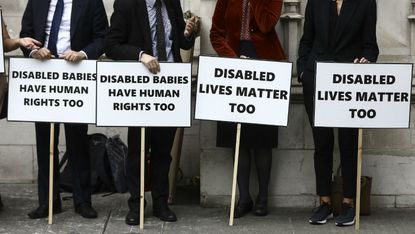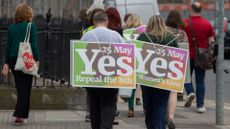Why did the Supreme Court uphold Northern Ireland’s strict abortion laws?
Majority of judges reject campaigners' challenge, but say the existing legislation is incompatible with human rights law

The Supreme Court has rejected an appeal by human rights campaigners challenging Northern Ireland’s restrictive abortion laws.
Unlike in other parts of the UK which are covered by the 1967 Abortion Act, a termination in Northern Ireland is only permitted if a women’s life, or permanent mental or physical health is at risk.
What did the court say?
Subscribe to The Week
Escape your echo chamber. Get the facts behind the news, plus analysis from multiple perspectives.

Sign up for The Week's Free Newsletters
From our morning news briefing to a weekly Good News Newsletter, get the best of The Week delivered directly to your inbox.
From our morning news briefing to a weekly Good News Newsletter, get the best of The Week delivered directly to your inbox.
The Northern Ireland Human Rights Commission (NIHRC) had appealed to the court on the grounds the current law was in breach of the European Court of Human Rights – a claim which was narrowly defeated on technical grounds because the proceedings did not involve an identified victim.
However, in a hugely symbolic ruling for pro-choice campaigners, a majority of judges went on to add that Northern Ireland’s existing abortion law was incompatible with human rights law in cases of fatal foetal abnormality and sexual crime.
What happens next?
Although the decision is not a formal declaration of incompatibility, because the case has technically been dismissed, “the judgment triggered fresh calls for the government and politicians in Northern Ireland to deal with the issue” says The Guardian.
Last month, the Republic of Ireland overwhelmingly voted to repeal the country’s strict abortion laws, leaving Northern Ireland as the only part of Britain or Ireland with such a restrictive regime.
The vote piled further pressure on Theresa May to intervene and force a referendum on relaxing the laws in Northern Ireland – something she has rejected, arguing it is the responsibility of the devolved assembly in Stormont.
Where does this leave Northern Ireland?
“While the case's dismissal means the government is not obliged to change the law” says the BBC’s Marie-Louise Connolly, BBC News NI health correspondent, “the seven judges have given a strong nod that reform is needed”.
“However, those who argue the law should stay the same will take comfort that the majority of judges agreed the NIHRC didn't have the right to bring the case” she adds.
Sinn Fein, which backs calls for some change to the law, said the court’s judgement made clear that the status quo was untenable when it came to cases of fatal abnormality and rape.
However, its Democratic Unionist (DUP) rivals hailed the ruling a victory for pro-lifers.
It means that with Westminster unable or unwilling intervene, a power-sharing deal nowhere in sight and Northern Ireland’s two main parties bitterly divided on the issue, changes to the law still seem a long way off.
Create an account with the same email registered to your subscription to unlock access.
Sign up for Today's Best Articles in your inbox
A free daily email with the biggest news stories of the day – and the best features from TheWeek.com
-
 'Make legal immigration a more plausible option'
'Make legal immigration a more plausible option'Instant Opinion Opinion, comment and editorials of the day
By Harold Maass, The Week US Published
-
 LA-to-Las Vegas high-speed rail line breaks ground
LA-to-Las Vegas high-speed rail line breaks groundSpeed Read The railway will be ready as soon as 2028
By Peter Weber, The Week US Published
-
 Israel's military intelligence chief resigns
Israel's military intelligence chief resignsSpeed Read Maj. Gen. Aharon Haliva is the first leader to quit for failing to prevent the Hamas attack in October
By Justin Klawans, The Week US Published
-
 France enshrines abortion rights in constitution
France enshrines abortion rights in constitutionspeed read It became the first country to make abortion a constitutional right
By Peter Weber, The Week US Published
-
 Why the Troubles Act faces a legal challenge in Belfast
Why the Troubles Act faces a legal challenge in BelfastThe Explainer Relatives of victims bring case against controversial legislation to High Court
By Julia O'Driscoll, The Week UK Published
-
 Abortion law reform: a question of safety?
Abortion law reform: a question of safety?Talking Point Jailing of woman who took abortion pills after legal limit leads to calls to scrap ‘archaic’ 1861 legislation
By Harriet Marsden Published
-
 Repeal the Eighth: how have abortion services changed in Ireland five years on?
Repeal the Eighth: how have abortion services changed in Ireland five years on?Today's Big Question Report finds access is still limited and unequal, but proposed legislation changes may be delayed
By Harriet Marsden Published
-
 Alexandria Ocasio-Cortez and 17 other lawmakers arrested outside US Supreme Court
Alexandria Ocasio-Cortez and 17 other lawmakers arrested outside US Supreme CourtSpeed Read The Congress members were attending a protest in support of abortion rights
By The Week Staff Published
-
 Roe vs. Wade overturned: what the ruling means for other American rights
Roe vs. Wade overturned: what the ruling means for other American rightsfeature A Supreme Court scholar explains the impact of ‘revolutionary’ abortion ruling
By The Week Staff Published
-
 Can Joe Biden do anything to preserve US abortion rights?
Can Joe Biden do anything to preserve US abortion rights?Under the Radar President warns Supreme Court against threatening ‘stability of our law’
By The Week Staff Last updated
-
 Lizelle Herrera arrest highlights rising tensions over Texas abortion laws
Lizelle Herrera arrest highlights rising tensions over Texas abortion lawsWhy Everyone’s Talking About The case has ‘confounded activists on both sides of the abortion debate’
By Julia O'Driscoll Published